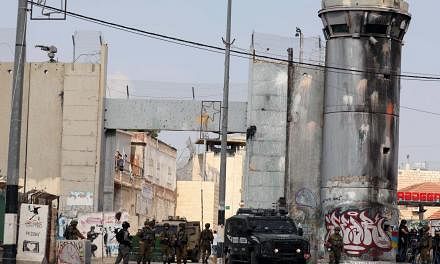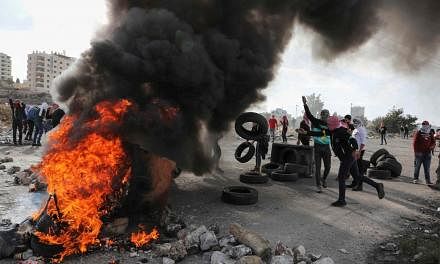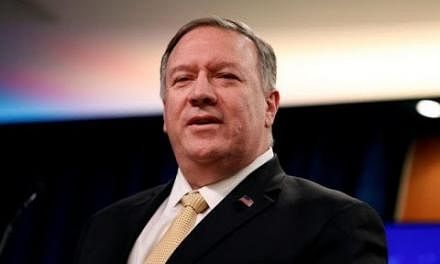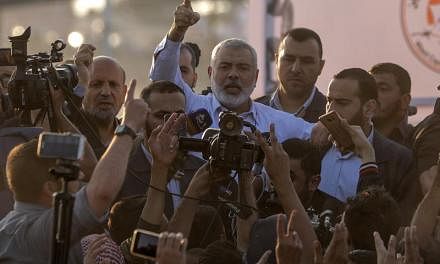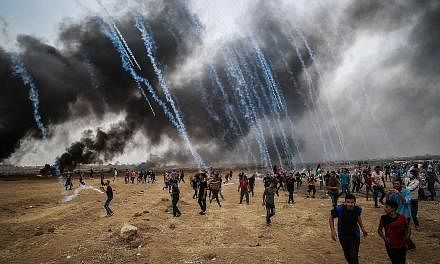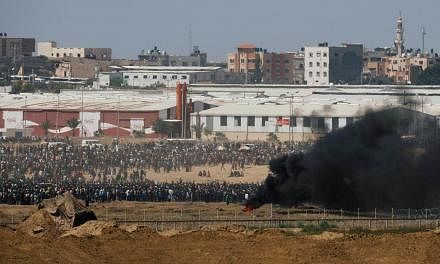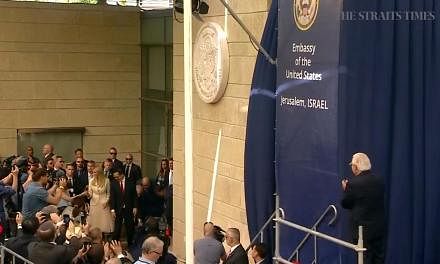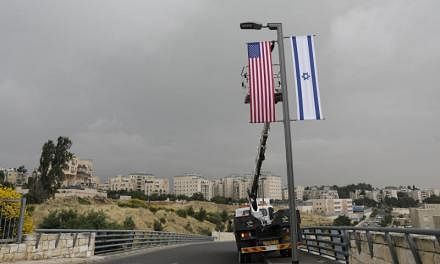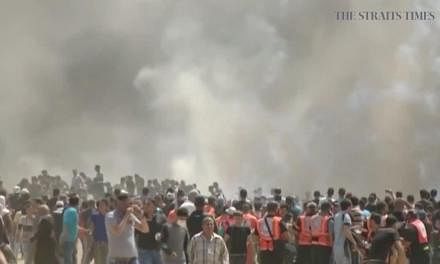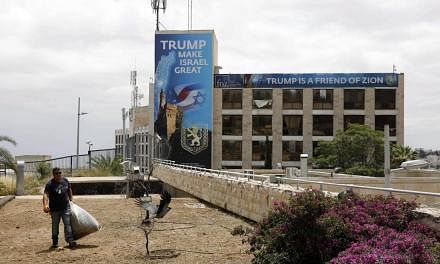TEL AVIV • In their reaction to the speech of US President Donald Trump recognising Jerusalem as Israel's capital, Israelis and Palestinians stuck to their respective narratives.
One side interpreted it as unfettered support, while the other lamented it and uttered threats. Both are in for a surprise once they appraise the full content of a carefully crafted presidential speech.
In Jerusalem, where Israeli politicians struggled to out-thank one another in Twitter posts to the US President, the authorities illuminated the mediaeval city walls with the American and Israeli flags as a sign of deep gratitude for his "historic decision".
The Palestinians had a festival of lights of sorts too, setting American flags and effigies of Mr Trump ablaze in protest. Here, politicians competed in disparaging the White House and making dark predictions.
In Ramallah, the anger and sense of insult were almost palpable. Mr Mahmoud Abbas, President of the Palestinian Authority, declared in a brief televised speech that the United States had disqualified itself as a mediator in negotiations with Israel.
"These condemned and unacceptable measures are a deliberate undermining of all efforts exerted to achieve peace and represent a declaration of the United States' withdrawal from undertaking the role it has played over the past decades in sponsoring the peace process," he said.
He lambasted Mr Trump for taking decisions that "reward Israel for denying agreements and defying international law, and encourage it to continue its policy of occupation, settlements, apartheid and ethnic cleansing".
Palestinian chief negotiator Saeb Erekat defined the speech as "the most dangerous decision that any US president has ever taken".
Relocating the US Embassy from Tel Aviv to Jerusalem was "prejudging, dictating and closing doors for negotiations".
Ultimately, he was "pushing this region towards chaos (and) violence", Mr Erekat told the satellite channel Al Jazeera.
Since now it was "meaningless" to erect a Palestinian state without Jerusalem as its capital, his people were left only one option: "To fight for equal rights" in a single state between the Jordan River and the Mediterranean, he claimed.
The radical Islamist Hamas movement, which controls the Gaza strip, stated that Mr Trump had "opened the gates to hell".
"Recognising Jerusalem as Israel's capital is an aggression against all Arab and Muslim states, and against free people all over the world," said one of its leaders, Izat al Rasheq. He swore that Israel would one day disappear, and "Jerusalem will remain the capital of Palestine, the Arabs and Muslims".
By contrast, Israeli politicians outpraised each other in Twitter posts of thanks for Mr Trump.
Mr Naftali Bennett, Minister of Education and leader of the settler party Jewish Home, congratulated Mr Trump on "making history" and called "upon the rest of the world to follow".
It was left to Mr Issawi Frej, a backbencher from the left opposition party Meretz, to offer the most dispassionate and accurate analysis of Mr Trump's speech: Nothing much had occurred, he opined.
Mr Trump had announced the relocation with fanfare - while silently signing yet another deferral of its execution. He could have simply changed the status of the existing US consulate in Jerusalem. Instead, he solely directed the State Department to "begin preparation to move the American Embassy from Tel Aviv to Jerusalem".
While it would "immediately begin the process of hiring architects, engineers and planners", this is a process bound to take years - more than enough time to restart negotiations for agreeing on a two-state solution, which Mr Trump endorsed for the first time since taking office.
There were more elements in his speech that should have upset the Israelis and delighted the Palestinians. Mr Trump stated that his recognition was only "acknowledging the obvious. That Jerusalem is Israel's capital. This is nothing more or less than a recognition of reality".
Still, he stressed that he was aiming for "an agreement that is a great deal for the Israelis and a great deal for the Palestinians".
As opposed to interpretations offered in the Middle East and elsewhere in the world, the President insisted that he is "not taking a position of any final status issues, including the specific boundaries of the Israeli sovereignty in Jerusalem or the resolution of contested borders. Those questions are up to the parties involved."
By speaking of boundaries of Israel in Jerusalem, Mr Trump was actually implicating dividing the city. For listeners who missed this fine point, the President reiterated that he would support a "solution if agreed to by both sides" - granting the Palestinians a right to veto any solution in Jerusalem not to their liking.
On Wednesday evening, Israelis and Palestinians preferred to ignore these subtleties and dedicate themselves to their respective narratives.
It may be up to Vice-President Mike Pence, who is about to visit the region soon, to clear up the finer points of Mr Trump's speech and their far-reaching potential repercussions.


